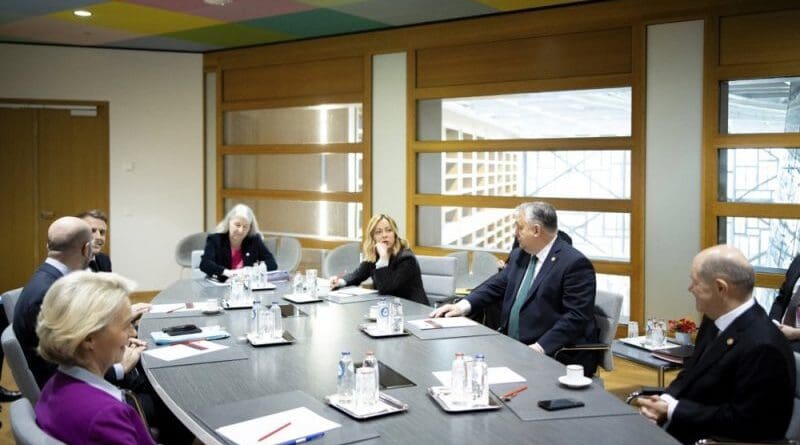EU Agrees Unanimously On €50 Billion Financial Aid For Ukraine
By EurActiv
By Alexandra Brzozowski
(EurActiv) — All EU leaders, including Hungary, agreed on a deal to provide predictable long-term financing to Ukraine at the start of their summit on Thursday (1 February), ending weeks of uncertainty after Prime Minister Viktor Orbán had threatened to veto the package.
In the run-up to the summit, leaders were bracing for a showdown with Orbán, who had seemed resolute in his demands for an annual review of Ukraine aid, including a right to veto it every year.
But barely half an hour into the official start of Thursday’s EU summit talks, European Council President Charles Michel announced that there was a deal to provide financial support to Ukraine until 2027.
“All 27 leaders agreed on an additional €50 billion support package for Ukraine within the EU budget,” Michel wrote on X.
“This locks in steadfast, long-term, predictable funding for Ukraine,” he added.
How the deal was made
Confirmation of the swift agreement came after a small group of EU leaders before the formal summit persuaded Orbán to drop his veto over the funding package.
In last-ditch closed-door breakfast talks, Orbán met with German Chancellor Olaf Scholz, French President Emmanuel Macron, Italian Prime Minister Giorgia Meloni, and EU chiefs Ursula von der Leyen and Charles Michel.
According to an EU official, it was during that meeting that Orbán confirmed he would lift his reservations about the aid package.
The talks were later expanded with other leaders, including Dutch Prime Minister Mark Rutte, Polish Prime Minister Donald Tusk, Spanish Prime Minister Pedro Sanchez, Estonia’s Prime Minister Kaja Kallas and Belgian Prime Minister Alexander De Croo.
EU leaders managed to win over Budapest with three additions.
As a concession to Orbán, the deal includes a provision for EU leaders to hold an annual debate on the implementation of the Ukraine aid package based on a compromise proposal floated ahead of the summit.
This would be accompanied by an annual European Commission report on the implementation of the facility, according to people familiar with the discussion.
If needed, in two years, EU leaders could also invite the EU’s executive to make a proposal for review in the context of the EU’s next multi-annual budget (MFF).
EU officials and diplomats described the concessions as minor as they have avoided a full veto scenario and the need to move ahead with a decision with EU26, effectively making the provision of aid to Ukraine more complicated and time-consuming.
The Belgian EU Council presidency is expected to hold negotiations with the European Commission and European Parliament in Strasbourg on Monday (5 February) to get the legal instruments approved as soon as possible.
Speaking to reporters after the announcement, European Parliament President Roberta Metsola said she welcomed the agreement by EU leaders even though it is not “ideal.”
“Is it an ideal scenario? No. But have we found unity and unanimity today? Yes, and we sent a message opposite to what Putin would have wanted,” Metsola said.
“One of our concerns was that we would not like the money to be taken outside of the Ukraine budget, and it was not, as that would have excluded the [European] Parliament,” she added.
Ukraine hails deal
Speaking to EU leaders via video link, Ukraine’s President Volodymyr Zelenskyy praised the decision as “a clear signal that Ukraine will withstand and that Europe will withstand”.
”The last time a European Council meeting was held, the credibility of Europe was at stake – and we all together strengthened that credibility,” Zelenskyy told EU leaders.
“The EU has proven that its word matters and its promises work for the interests of entire Europe,” he said.
However, Zelenskyy also struck a more sombre tone, recalling that the EU is expected to fall short of its self-set-one million ammunition target for Ukraine.
“Unfortunately, the implementation of the European plan to supply one million artillery shells to Ukraine is being delayed – and this too is a signal of global competition, in which Europe cannot afford to lose,” he said as EU leaders were to discuss their military support for Kyiv.
In Kyiv, Ukraine’s Prime Minister Denys Shmyhal hailed the deal as support that will help realise a joint victory.
“Each of your votes is a significant contribution to our joint victory,” Shmyhal said in a message on social media thanking EU member states for the decision.
He added that the agreement displayed “solidarity” and “unity” in the 27-member bloc.

